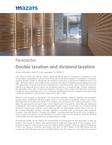
Double taxation and dividend taxation
Law 1819 of 2016, the last tax reform, taxed dividends paid by Colombian companies to their shareholders (subscribers or similar) when these were individuals resident in Colombia or individuals resident abroad, entities or companies not resident in Colombia, or permanent establishments of the latter. While the rate for non-residents was set at 5%, the rate for residents was set between 0% and 10% depending on the annual amount received, this, if according to the rules of article 49 of the Tax Statute it corresponds to an income not constituting income or occasional gain -Incrgo-, otherwise, the applicable rate is 35%. Finally, the treatment of Incrgo on the receipt of dividends by Colombian companies was maintained, and, in turn, dividends distributed by foreign companies and received by individuals resident in Colombia were taxed at the rate of 35%.
Without much analysis or discussion, the Colombian legislator opted to abandon the exemption system and to establish the double taxation system in the taxation of dividends. While in the former, the profits that are taxed in the head of the company are not taxed in the head of the partner, in the latter, the same profits are taxed, both in the company and in the partner, when they are distributed as dividends. The haste to establish the dividend taxation regime in Colombia, as a measure strictly aimed at increasing tax collection, led to dispense with the intermediate system, which is known as the income integration system (currently applied in countries such as Australia, New Zealand, Canada, Chile and Mexico). Through this system, it is presumed that the profit of the company is really a profit of the partner, so that although it is taxed on behalf of the company, when the dividend is distributed, it is accompanied by its corresponding tax credit.
As these tax credits can be used by the shareholders as mechanisms for real attenuation of their tax burden, they acquire a market value and become an important asset (right) for the company. Such importance acquire in the economy such tax credits (called in English "franking credits") that because of them, are facing, in Australia, according to the April 13, 2017 edition of the Wall Street Journal, companies Elliot Management Corp. and BHP Billiton Ltd. The reason for such discord is because the former, holding a 4.5% shareholding in the latter, is pushing for the Australian mining company (BHP Ltd.) to acquire the shares of its British sister company (Billiton PLC) paying for such acquisition with the "franking credits" or tax credits (which to date amount to USD$9.7 billion) and thus being able to redomicile corporately in Australia, a proposal that the mining company dismisses as it considers that this would use a valuable right in a non-strategic acquisition.
Thanks to the improvisation of the Colombian legislator, we are in the worst of all worlds in terms of taxation of dividends. Our system today has something of the total exemption system, as when the dividend is received by a national company and is treated as an Incrgo; it also has something of the double taxation system, as when the dividend is paid to a natural person in an amount higher than 600 UVT's and therefore the income is taxed both at the corporate level and at the level of the partner; it also has something of triple taxation, as when the dividend is paid to a permanent establishment (E. P.) of a foreign company in Colombia (generating the 5% tax) and then such P.E. remits the same to its parent company (generating again the 5% tax), and it has nothing of the income integration system, thus preventing the generation of tax rights exchangeable for goods, as in the case of BHP Billiton.


